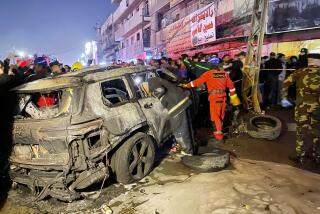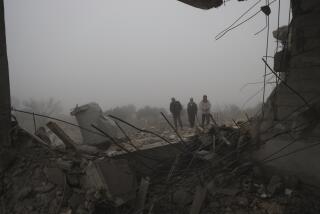From the archives: Iraqi Leader Basks in Glow of Victory, Arabs’ Respect
BAGHDAD, Iraq -- In the lobbies of Baghdad’s luxury hotels, portraits of President Saddam Hussein, attired in a Western suit, beam serenely on clusters of foreign businessmen.
Posters in the pastoral towns of northern Kurdistan portray the president bending to hug a girl of Iraq’s troubled Kurdish minority. And on the cease-fire line outside the devastated southern city of Al Faw, where Iraqi and Iranian soldiers face each other across the 440-yard breadth of the Shatt al Arab waterway in an uneasy truce that halted their brutal eight-year war last August, he is depicted in battle camouflage, cradling a Kalashnikov assault rifle.
These are the faces of Saddam Hussein, a vain man, ruthless, but in the eyes of many Iraqis a victor. It is an image that the 52-year-old president nourishes, here and abroad. Recent propaganda photos show him in traditional Arab dress--a message that Iraq now hopes to play a wider role in the Middle East.
There are signs that Hussein’s Arab brethren are responding. Despite a war-gutted treasury, Iraq has emerged from conflict with a greater sense of unity. And it has a big, battle-tested army, oil reserves reputedly second only to Saudi Arabia’s and wartime reforms that have loosened the socialist shackles on the economy. Potentially, Iraq is a country to be reckoned with.
“Some of the information ministers from other Arab countries were up here recently,” a Baghdad-based diplomat said. “Saddam told them, ‘We all live in one tent, but each of us lives in a separate state.’ ”
Hussein’s corner of the Arab tent is not without problems.
The war has been halted, but it may not be over. Peace talks between the two sides in Geneva have stalled on the issue of exchanging prisoners of war, with an estimated 70,000 Iraqi soldiers still held in Iran and 35,000 Iranians behind barbed wire in Iraq.
After an inspection tour of the cease-fire lines, Marack Goulding, an assistant secretary general of the United Nations, said here last week that both sides have repeatedly violated the truce established Aug. 20 and that “the recent violations have been greater in extent.”
A diplomat warned, “If you don’t have a decisive victory, war is continuous in some form or other.” He said the Iraqis were surprised when Iran’s supreme leader, the Ayatollah Ruhollah Khomeini, “took the bitter poison” and agreed to the truce.
Iraqis Show Patience
“The Iraqis have been very patient,” he said. “They have been provoked up and down the border. They have the capacity to retaliate, and they have not done it. The Iraqis have clearly developed a taste for peace.”
But they are also reveling in the outcome of the war, a cease-fire forced on Iran by the Iraqi army and superior air force. Iraqi forces still hold some Iranian territory on the central front.
“These guys are a warlike people,” the diplomat went on. “They accept the glorification of a warrior leader, whether it’s Saddam or Nebuchadnezzar.”
But pride in winning a truce in a war their own regime started does not discount the terrible toll. Foreign residents of Baghdad say that few Iraqi families escaped the Islamic martyrdom of a father, a son or a brother. Relatives of the dead were singled out for special pensions and allotments. Some mothers were given new red Volkswagens.
Hussein has wrapped himself in the flag of apparent victory. Iraq’s press, government-owned, portrays him as a man of beneficence. Daily Page 1 photographs of the president show him sitting alone in a thoughtful pose, or meeting visitors: Hussein the statesman.
Supports Mainline PLO
This is the man whom neighboring Arab leaders watched with suspicion a decade ago when his embassies abroad were known centers of subversion and radical ideology. In those years, Baghdad was a solid member of the Rejectionist Front on the Israeli-Palestinian issue. Iraq sheltered breakaway groups of the Palestine Liberation Organization. Today, Hussein is no less an advocate of the Palestinian cause, but he has switched his public support to the mainline PLO.
“Whatever Yasser Arafat wants is OK with Hussein,” a longtime political analyst here said recently.
On regional policy, Hussein was instrumental in the formation last February of the Arab Cooperation Council, ostensibly an economic league made up of Iraq, Egypt, Jordan and Yemen. Some outsiders disparage this group as “the poor man’s club,” but it is one that gives Hussein a broader stage on which to strut.
Some diplomats suggest that the Arab Cooperation Council was designed in part as a political counterweight to the older Gulf Cooperation Council, which has become an effective policy forum for Saudi Arabia, Kuwait and other Persian Gulf countries.
The Saudis and Kuwaitis, despite their war support, remain concerned about Iraqi intentions, pointing to its formidable military machine, according to Baghdad-based diplomats. Having faced the aspirations of the late Shah Mohammed Reza Pahlavi of Iran to be “policeman of the gulf,” as well as the Islamic fundamentalist exertions of Khomeini, the shah’s successor, the rich but underpopulated gulf kingdoms are wary of any self-proclaimed protector of their turf.
At present, Baghdad’s only overt foreign meddling is taking place in little Lebanon, where Hussein has sided with and supplied the Christian side in a proxy war with his longtime nemesis, Hafez Assad of Syria.
“Saddam says he’s a changed man,” a diplomat observed. “Let’s see. But nobody’s caught him in any shenanigans abroad recently.”
At home, Hussein has matched his economic reforms with pledges of a liberalized political system. A new constitution that would provide for opposition parties and some press freedom was promised, and the April 1 National Assembly elections were hailed by the presidential palace as a step toward democracy.
Any move toward domestic liberalization would run counter to past performance. Iraq remains a police state, with layer upon layer of operatives on the streets of Baghdad. Security men answer only to their superiors. Foreign residents say they have seen unprovoked killings in daylight and tell of knock-in-the-night arrests of Iraqi acquaintances.
Credited With Progress
Yet foreigners and Iraqis alike credit Hussein with lifting Iraqi society into a sharply higher state of development since his party took power in a coup in 1968 and with raising the level of education to an enviable position in the Arab world.
But while they wait for the promise of more reforms, they are saddled with a high-cost economy and a crushing war debt that resumed oil production cannot cover. Petroleum earnings bring in an estimated $12 billion a year, but Baghdad owes its Western and Soviet Bloc creditors more than $30 billion, and a similar amount--likely to be forgiven--to Saudi Arabia, Kuwait and other Persian Gulf states that supported Baghdad during the war.
Turn From Socialism
The heat of war forced Hussein to abandon the state socialist principles of his ruling Baath Party. He turned over whole sectors of the economy to private interests in hopes of boosting production. Agricultural processing, for instance, is now almost entirely in private hands, and most medium and small state enterprises are up for sale, including Baghdad’s big hotels.
A key economic result of the war, diplomats say, was to put the remaining state enterprises, including the war-related industries, in competent hands.
“Saddam bit the bullet on this one,” one envoy said, explaining that the president turned out the political hacks who had been given control of the enterprises and replaced them with
$5-Billion Face-Lifting
Except for the port cities of Basra and Al Faw on the southern front, Iraqi cities, including Baghdad, were not greatly damaged in the war. Now, in a widely trumpeted reconstruction program, more than $5 billion has been allotted for repairs and civic improvements in the south, with the Saudis reportedly supplying the materials free.
Basra, a refinery center and Iraq’s second-largest city with a population of 1.5 million before the war, was heavily damaged by shelling. Almost all the buildings remain standing, but many were holed or pitted by artillery. From the gleaming Sheraton Hotel on the Shatt al Arab to the inland outskirts, the city streets are barely passable, jammed with cranes, trucks and cement mixers in a renovation program clearly designed to do more than repair the ravages of war.
“The noise is terrible, worse than the war,” the operator of a kiosk near the Sheraton said, “but we will have a new Basra.”
Prospects seem less certain for Al Faw, the now-deserted town near Iraq’s main prewar oil port on a peninsula south of Basra. Captured by the Iranian forces late in the war, in 1986, the Faw Peninsula is now a wasteland of shattered date palm groves, battered bunkers, discarded shell casings and blasted oil tanks, which in the still desert air look like so many fallen souffles.
The Iraqis admit that they lost 52,000 men in the two-year struggle for Al Faw, which was recaptured a year ago in a 36-hour rout, Operation Ramadan, which started the Iranian collapse on the southern front. The town itself was flattened by the fighting; its 20,000 residents are long gone.
The floor of a small mosque, used as a mess hall by the invading forces, is covered with abandoned Iranian pasta. And the only military presence left on the peninsula is a dug-in force of Iraqi troops, on alert for a collapse of the tenuous truce.
More to Read
Start your day right
Sign up for Essential California for news, features and recommendations from the L.A. Times and beyond in your inbox six days a week.
You may occasionally receive promotional content from the Los Angeles Times.






